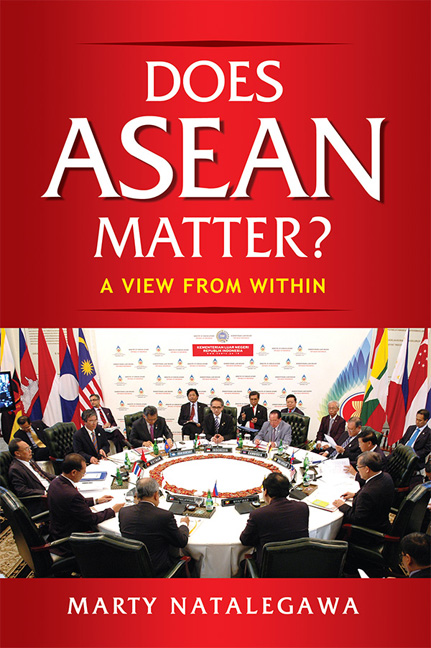Book contents
- Frontmatter
- Dedication
- Contents
- Introduction
- 1 Statecraft and Diplomacy in a World Transformed: 1967–2017
- 2 Southeast Asia: From Trust Deficit to Strategic Trust
- 3 ASEAN and the Region: From Cold War Pawn to ASEAN Centrality
- 4 From State-centric to People-centred ASEAN
- 5 ASEAN: Wither or Prosper?
- Appendix 1 Guidelines for the Implementation of the DOC
- Appendix 2 Declaration of the East Asia Summit on the Principles for Mutually Beneficial Relations
- Appendix 3 Statement of Asean Foreign Ministers on Asean's Six-Point Principles on the South China Sea
- Index
- About the Author
- Plate section
5 - ASEAN: Wither or Prosper?
Published online by Cambridge University Press: 08 June 2019
- Frontmatter
- Dedication
- Contents
- Introduction
- 1 Statecraft and Diplomacy in a World Transformed: 1967–2017
- 2 Southeast Asia: From Trust Deficit to Strategic Trust
- 3 ASEAN and the Region: From Cold War Pawn to ASEAN Centrality
- 4 From State-centric to People-centred ASEAN
- 5 ASEAN: Wither or Prosper?
- Appendix 1 Guidelines for the Implementation of the DOC
- Appendix 2 Declaration of the East Asia Summit on the Principles for Mutually Beneficial Relations
- Appendix 3 Statement of Asean Foreign Ministers on Asean's Six-Point Principles on the South China Sea
- Index
- About the Author
- Plate section
Summary
Has ASEAN mattered? Without hesitation, I can say, absolutely. Without ASEAN the past five decades could have been witness to an entirely different experience for the countries of Southeast Asia.
It would not have been too far-fetched to imagine the countries of Southeast Asia continuing to be enveloped by a deep sense of distrust and animosity, providing fuel for and sustaining the latent sources of conflict between them. It would not have been improbable for the countries of Southeast Asia to continue to be sharply divided along the interests of the extra-regional major powers — remaining as pawns in the proxy rivalries of non–Southeast Asian states. Indeed, Southeast Asia could have suffered the same fate as other regions afflicted by incessant conflict; namely, of economic regression and malaise, as well as the extensive neglect of human rights, good governance and democracy.
While ASEAN's record over the past fifty years has not been without blemish, and there have been critical moments in the region's evolution when ASEAN has been felt to be “absent” — divided even — there is little doubt that ASEAN has made a difference; it has mattered. However, to remain of consequence over the next five decades, clearly a business-as-usual approach by ASEAN will not suffice.
In the preceding chapters I have sought to make the case for ASEAN to recognize some of its likely future challenges and opportunities and, more importantly, to ensure that it is suitably equipped to manage and address these challenges, and to seize such opportunities. In my view — given, on the one hand, ASEAN's significant past achievements and, on the other, the constantly changing national, regional and global milieu — it is critical that ASEAN consolidates and secures aspects of its cooperation that have worked, adapt and adjust where necessary, and create and innovate where new forms of challenge and opportunities beckon.
In other words, ASEAN must find equilibrium between the need for change and continuity. In a world marked by a dizzying pace of change, an ASEAN that relies simply on its past achievements would run the risk of irrelevance. Conversely, an ASEAN overly driven to change for the sake of change — to reinvent the wheel, so to speak — may find itself not necessarily strengthened as a result.
- Type
- Chapter
- Information
- Does ASEAN Matter?A View from Within, pp. 228 - 235Publisher: ISEAS–Yusof Ishak InstitutePrint publication year: 2018

